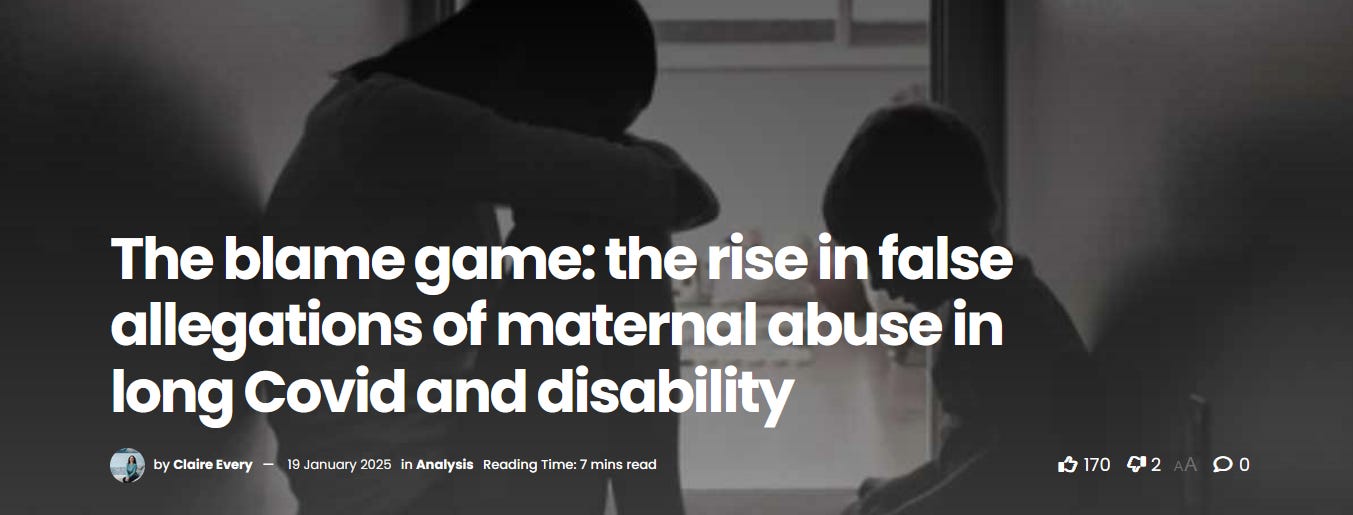The Blame Game: the rise in false allegations of maternal abuse in long Covid and disability
Long Covid allegations of FII intertwined with the rise of the far-right
Article Extract
Published in The Canary, 19th Jan 2025.
With Donald Trump’s election in the US, a wave of uncertainty has swept the globe: for the environment, gender, war, and health. However, the undermining of women’s rights has become a major theme throughout the presidential campaign. As we lurch further into climate breakdown and instability, the further society sways to the far right – just as the world did after the Spanish Flu pandemic in 1918. A place where simple answers are easier to stomach than a complex reality, the vulnerable are seen as disposable, and there’s always someone else to blame – not least, in this context, with long Covid.
Here we are focusing on laying the blame on women; the blame on mothers. Austerity, a ragged and inflexible NHS, a pandemic, an unfit SEND system and policy changes have led to an increase in false safeguarding accusations – almost always against the mother. Nevertheless, the framework and systemic tendency for medical misogyny is rooted in the beginnings of medicine. It is a conservative, top-down, and authoritarian structure built on strong foundations of patriarchy and patrimony.
The Cerebra Report (2023) by Clements and Aiello found allegations of Fabricated Induced Illness (FII) against parents of disabled children were widespread, often causing devastating and lifelong family trauma. It’s one thing to go for help and not find any medical care. It’s another to be blamed for your child’s disability and illness. Clements discovered parents with disabilities were four times more likely to face accusations compared to non-disabled parents.
The pandemic continues to leave in its wake a monstrous wasteland of chronic illness. One of those hydras is long Covid.
Long Covid: Nothing new under the sun
In the early days of Covid, we were reassured that children were not affected, and post-acute viral disease was not even mentioned. Yet, these were simple answers for a complex situation. In March 2024, the ONS found that over 111,000 children have long Covid: a devastating, multi-system disease. Denial and the desire for normalcy have led to more families facing traumatic safeguarding referrals in an effort to divert blame and avoid institutional responsibility.
This is nothing new in the world of myalgic encephalomyelitis (ME/CFS), disability, and chronic illness. The LeAP research program found social care policies in the UK assume parental failings as a default position. One in five families with a child with ME faced false claims resulting in child protection involvement. Families with children with long Covid now find themselves inheritors of a precarious and dangerous system.
But how has this become so ubiquitous in medicine that it barely registers as a concern for healthcare professionals? Again, we come back to systemic problems: medics overstretched and alienated from patients; education that rarely covers post-acute viral illness; a protective and anti-whistleblower culture; a root bias towards acute illness, and an ingrained attitude denigrating ME and many chronic illnesses medicine deems unexplainable.
Another key reason for this growing problem is psychiatric trespass.
Psychiatric Trespass
Within the field of liaison psychiatry and psychosomatics, CFS, CFS/ME, IBS, FM, CI, CS, EI and a number of other conditions, for example, chronic Lyme disease, are bundled under the so-called “Functional Somatic Syndromes” (FSS) and “Medically Unexplained Syndromes” (MUS) umbrellas”. DSM-5 Working Group, DX Revision Watch.
And here is the problem.
In courses, textbooks, and cultural assumptions, we have the pernicious belief that medically unexplained symptoms (MUS) and its other forms have psychiatric factors. Which is why professionals can be so quick to call in child protection. Because if you have a mentally disturbed mother, that child is in danger and safeguarding action is needed. With ME/CFS and long Covid often assumed to be MUS or a Perplexing Presentation (PP) it is clear there’s a growing risk to children and families.
However, it is a blunt instrument – with the majority of all safeguarding referrals unfounded and causing untold damage. Action for ME found that 70% of cases were dropped in a year. Tymes Trust has been involved in over 140 cases; none resulted in a guilty verdict. The Cerebra Report found that 84% cases were abandoned or had no follow up. Dr. Nigel Speight, involved in over 200 cases over the last 25 years, said:
In c.98% of all the other cases, proceedings were aborted without a court order and the case eventually closed. Some of these cases had to experience prolonged social work involvement, albeit with no real threat of removal.
It is this wild, free-reign that psychiatry and the DSM-5 have that is so dangerous. It can claim, without evidence, any poorly understood disorder without due warranty, into psychological abnormality due to its broad reclassification of somatic symptom disorder (SSD) in the DSM-5. It’s such a vast overreach that psychologists have classed up to 23% of the population as having maladaptive thoughts connected to physical symptoms. Long Covid, ME, and other long-term illnesses can easily be given a psychiatric SSD diagnosis.
‘Professional’ Overreach – and not just in long Covid
In the book Cracked, Dr James Davies states:
first we named a so-called medical disorder before it has identified any pathological basis in the body. So even when there’s no biological evidence that a mental disorder exists, that disorder can still enter the DSM and become part of our medical culture.
However, it is not just the DSM-5. ME is in the liaison psychiatry and functional somatic syndromes of a major textbook, Kumar and Clarke’s Clinical Medicine. It is no wonder why women with ME can be sectioned so easily or starved to death.
Another way psychiatry has overreached is that the Royal College of Paediatrics and Child Health (RCPCH) have included PP and MUS as an alerting sign for FII in their guidance.
There are fundamental issues here. One being that the RCPCH alerting signs are not derived from any peer-reviewed research. This amalgamation of conditions is increasing unlawful adverse discrimination at an alarming rate. Yet the RCPCH does not recognise the harm caused by false allegations. Even the British Association of Social Workers state in its FII Practice Guide:
If social workers were to follow the RCPCH guidance, the proposed assessment criterion for FII is likely to cast suspicion on many families who are not harming their children, including children and young people with disabilities and illnesses that are undiagnosed.
FII is an accepted very rare condition. Gullon-Scott and Long estimated between 53-376 cases in the UK and that the RCPCH guidelines lead to an extraordinary number of false positives.
But it is the human story that we need to remember…






Brilliant article Claire. It’s telling that even the BASW caution against the RCPCH’s position